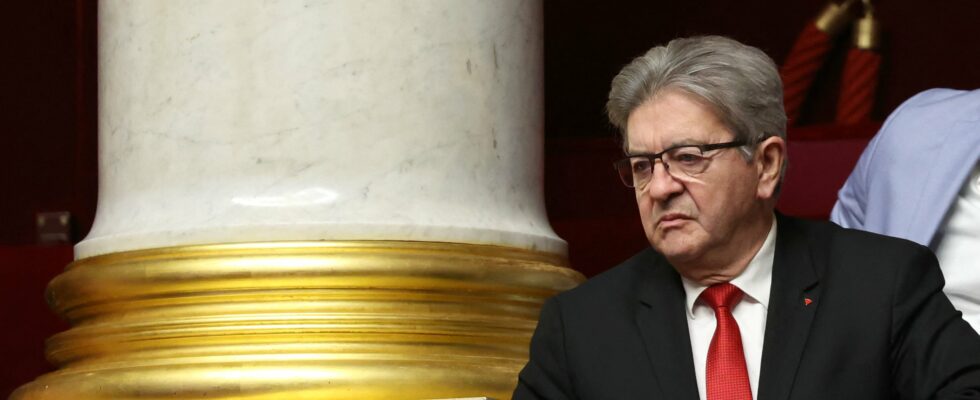A near-unanimous vote. Of the 192 deputies who are members of the different groups of the New Popular Front, 190 ultimately chose to censure Michel Barnier’s government this Wednesday afternoon. Only the socialist MP Sophie Pantel and the Caledonian separatist elected official Emmanuel Tjibaou ultimately did not add their voice to the motion of censure, destroying the meager hopes of the central bloc to see the Socialist Party reverse its decision to bring down the ‘executive. But this unity of one afternoon is not enough to erase the differences which are thickening between the main left-wing forces. At the dawn of the post-Barnier era, tensions between France Insoumise and the Socialist Party seem more and more marked.
As for Jean-Luc Mélenchon’s troops, the line seems to remain fixed: either Emmanuel Macron appoints Lucie Castets as Prime Minister, the candidate designated by the New Popular Front last summer, or the Insoumis will oppose the next tenant en bloc from Matignon. “If Emmanuel Macron does not appoint a Prime Minister from the NFP, we will automatically censor the government,” reminded the president of the rebellious group Mathilde Panot on LCI this Thursday morning.
The position has not changed since that displayed by Jean-Luc Mélenchon on the evening of the second round of the legislative elections: “nothing but the program, but the whole program”, thus opposing any agreement in principle with the Macronist camp. And if Emmanuel Macron refuses their demands, in the eyes of the rebels there will only be one option left: the resignation of the President of the Republic and the holding of early presidential elections, for which LFI advocates without batting an eyelid. “The inevitable censorship has taken place. Even with a Barnier every three months, Macron will not last three years,” Jean-Luc Mélenchon wrote again on X this Wednesday evening.
A turnaround on the PS side
But the unequivocal support for the candidacy of Lucie Castets, and the desire for a government of the NFP alone, seem to have fizzled out among the rest of the left, and in particular among the socialists. If their disagreement with the Barnier government remained too important not to vote for censure, in recent weeks they have been increasing their declarations in favor of seeking a compromise with the central bloc. The boss of the socialist deputies Boris Vallaud was one of the first to move in this direction around ten days ago, by calling to “raise the question of the conditions of non-censorship” to all parties outside the RN in the event of an overthrow of the Barnier government.
The boss of the PS, Olivier Faure, for his part tried to clarify the position of his camp, constantly called for “responsibility” by the Macronists. “We need a left-wing Prime Minister who leads a left-wing government open to compromise,” he explained this Wednesday evening, affirming that this executive would refuse in particular the use of article 49.3. Olivier Faure also directly opposes the call for the resignation of Emmanuel Macron made by the Insoumis, with whom he claims to have a “divergence”. “I am not trying to block the institutions to push the head of state to resign. There has already been the madness of dissolution, we are not going to continue with the madness of dismissal,” repeated the leader of the socialists at the microphone of France Inter this Thursday morning.
A compromise, what compromise?
Rebels against socialists: the little music seems more and more insistent since the tough negotiations of the New Popular Front last June, and even the Nupes agreement in 2022. It remains to clarify the positions of the other left forces also present in the Assembly. On the side of ecologists, it is more the perspective supported by the Socialist Party which seems to be gaining ground. “In an exceptional situation, exceptional solution,” said Greens boss Marine Tondelier this Wednesday, calling for the search for a solution “within the framework of the Republican front”, addressing “centrists” and “macronists” . The environmentalist senator and former presidential candidate Yannick Jadot even pushed the idea further, calling for an “exceptional compromise”, with a government led by the left but including “ministers from the central bloc” in the name of a “transitional republican pact”. “It is up to the central bloc to decide, either it confirms and formalizes its alliance with the RN, or we work together. The NFP group came first, so the President of the Republic must finally address us,” he pleaded again this Thursday morning.
But if members of the central bloc like Gabriel Attal also plead for finding a form of agreement with the socialists, the way to translate it today seems very far from obvious. Compromise, yes, but behind me and my ideas: this is what emerges from everyone’s declarations, making the realization of any form of agreement a very distant hypothesis. And the names cited so far to replace Michel Barnier, from Sébastien Lecornu to François Baroin via François Bayrou, do not seem to indicate a sustained desire by Emmanuel Macron to turn to his left to find a majority in the Assembly .
Enough to make the rebellious camp say that wanting to find common ground with the Macronist camp is at best an unrealizable fantasy and a “chimera”, according to Manuel Bompard, at worst “a break with the New Front popular”, according to Mathilde Panot. “Will Emmanuel Macron appoint a Prime Minister ready to repeal the pension reform? No. End of story. Everything else is political fiction,” summarizes an LFI elected official to AFP. “If we want to have a chance of there being a left-wing government, we must all hit the same nail,” summed up the rebellious boss of the Finance Committee of the National Assembly Éric Coquerel, affirming that “ the only thing that can unite us is to continue to demand a government that carries the program of the New Popular Front.” Not sure that this unity will survive the political crisis.
